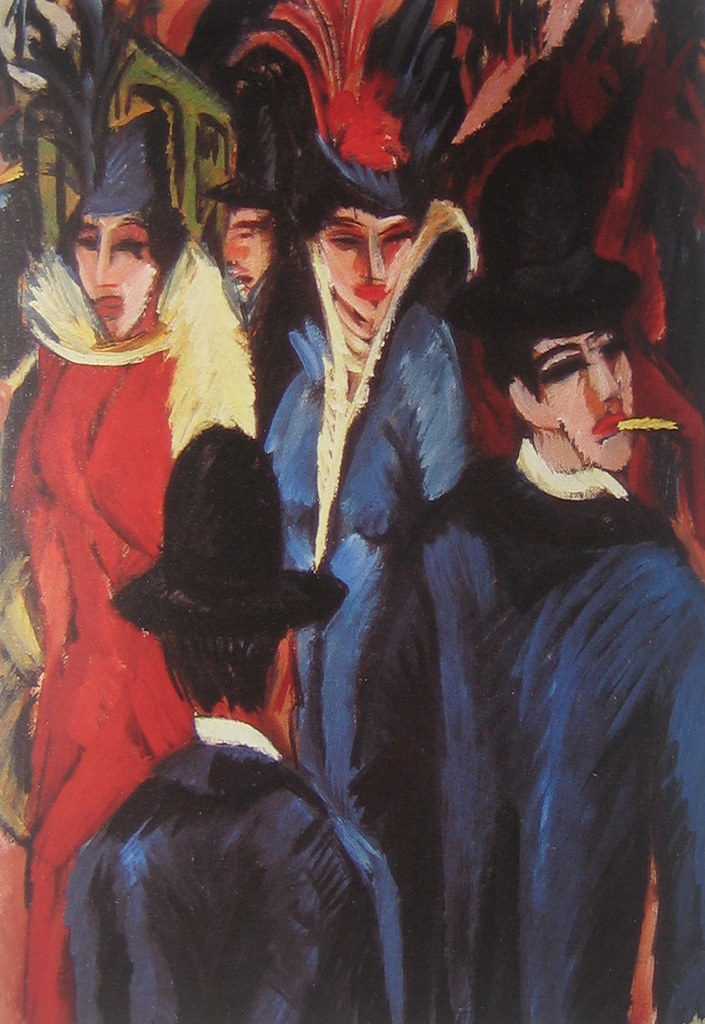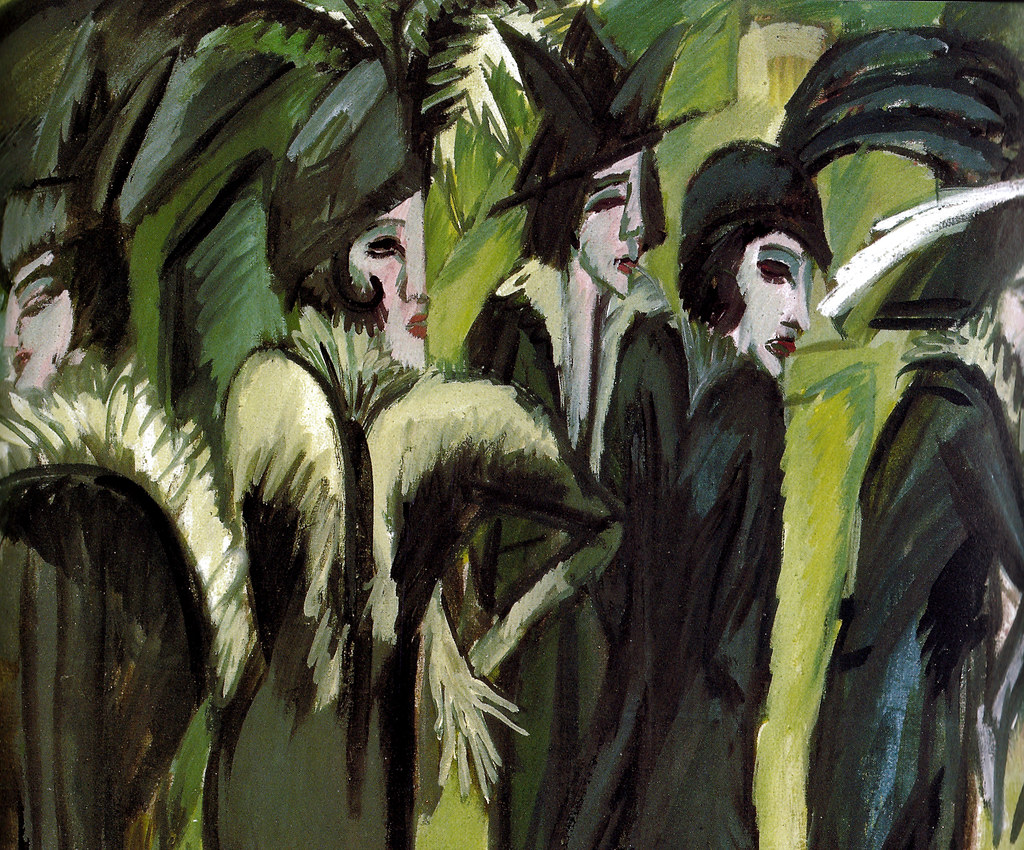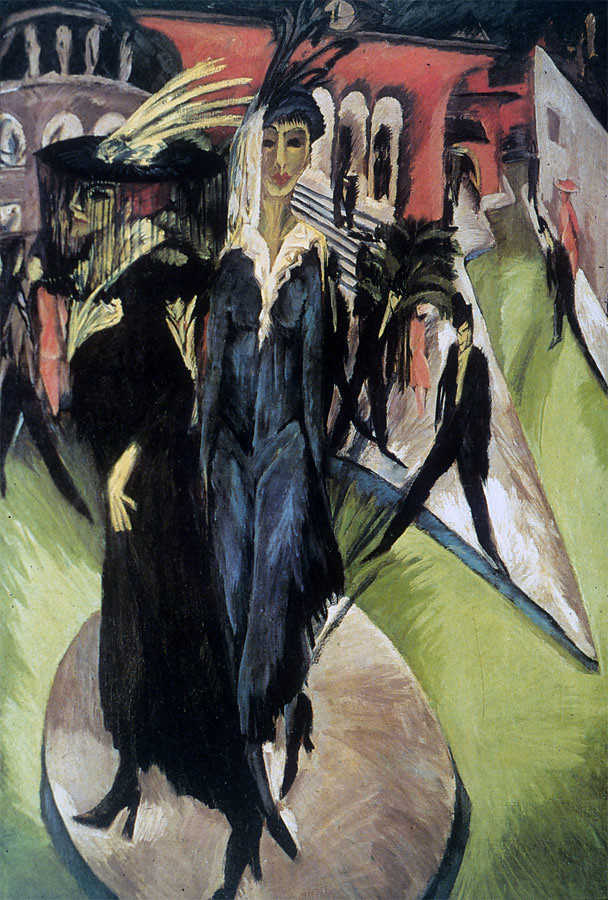.

Berlin Street Scene: Ernst Ludwig Kirchner (1880-1938), 1913-14, oil on canvas, 121 x 95 cm (Neue Galerie, New York)
Not that I intend this to have a political sense,
no not at all, biography of another, tenderer sort
is what I will sketch here, say she has
an unutterably significant behind.
With a deep cleavage she looked enchantingly fine
and would sit with propriety never before beheld,
a tuft of feathers tucked in her hair,
gleaming and gracious there at a table-d'hôte.
If she passes me by, she measures me not
with a single glance, not even the tiniest. Years
she lived in solitude, whisking down alleyways,
claiming, fabulously, that she was an Empress. Once
she gave me a smile, and I feel it was
a thousand years since ever she did so, not
that the lady was elegant, that I demur to claim,
yet with her eyebrows alone,
which seemed to belong to a countess,
she possibly could in my maybe a bit
arch-professorial view resolve
all the problems besetting our continent. Her hand,
O how beautiful! Only to kiss it was all
the sum, for months, of my wishes; index enough
of her merit, the worth she presented, enchantress.
I alone in reality know her,
the lady who calls herself Empress Europa.
Robert Walser (1878-1956): Not that I intend this to have a political sense (December 1928) from Robert Walser: Thirty Poems, selected and translated by Christopher Middleton: Christine Burgin/New Directions 2012

Berlin Street Scene (detail): Ernst Ludwig Kirchner (1880-1938), 1913-14, oil on canvas, 121 x 95 cm; image by Matthew Felix Sun, 15 September 2010 (Neue Galerie, New York)

Street Scene, Berlin: Ernst Ludwig Kirchner (1880-1938), 1913, oil on canvas, 120.6 x 91 cm; image by maru press, 15 July 2012 (Museum of Modern Art, New York)

Street Scene, Berlin (detail): Ernst Ludwig Kirchner (1880-1938), 1913, oil on canvas, 120.6 x 91 cm; image by cashoutcurse, 15 August 2008 (Museum of Modern Art, New York)

Five Women in the Street: Ernst Ludwig Kirchner, 1913, oil on canvas, 120 x 90 cm; image by mbell1975, 5 May 2012 (Museum Ludwig, Cologne)

Two Women in the Street: Ernst Ludwig Kirchner, 1914, oil on canvas (Kunstsammlung Nordrhein Westfalen, Düsseldorf)

Red Cocotte: Ernst Ludwig Kirchner (1880-1938), 1914, pastel on greyish white paper, 41 x 30.2 cm; image by masterpieceart, 25 March 2012 (Staatsgalerie, Stuttgart)

Study for Red Cocotte: Ernst Ludwig Kirchner, 1914, pencil, 20.5 x 16.6 cm (Brücke-Museum, Berlin)





6 comments:
Walser is stunning here, the way he backs into an idea with his word-constructions, comes up on it from behind: the mind tumbling over itself in its eagerness to speak. It catches you up. And in that last handful of Kirchner drawings there’s a savage line, a sense of plunging downward, perhaps to fit a savage time when a self-absorbed Empress Europa (“Not that I intend this to have a political sense, no not at all . . .”) was bent on self-destruction.
Hazen,
Walser, Kircher -- what semi-respectable counterfeit countess would give either one of those guys the time of day?
Yes, the "mind tumbling over itself in its eagerness to speak", and the line "plunging downward, perhaps to fit a savage time..."
This text is one of Walser's remarkable "Micrograms" or "Microscripts".
Some further examples, with information about Walser and his "tiny writing", may be found here
and here.
And a bit on Kirchner. The paintings were made in Berlin, when the artist was in his early thirties, almost exactly one hundred years ago.
Michael Glover, writing in The Independent, 3 November 2012, takes on the fourth image from the bottom here -- Two Women in the Street, 1914.
"You wince at all these odd shaftings of colours, so savagely thrown down. It feels like the hectic music of that strange man, Anton Webern. Women, you say? Well, what else are these night creatures?
"The two oddly menacing forms, with their blockish triangular faces, seem to be cutting with a kind of blade-like savagery through their murky and partially unreadable urban environment. They are daubed in an odd smeary glare of yellow and pink light, garish and slightly repulsive, as if the light itself is so much crudely applied maquillage.
"That environment through which they move seems to be closing in upon them even as they push it away with their mannered street strut. Whores or high-society dames pushing out the boat? Everything about them seems sharp – there are so many Vs in this painting, some upright, others inverted – from the cut of their clothes to their sharply attenuated hands, which hang down from them as if limply suspended from a hook.
"Kirchner was relatively new to Berlin when he painted such dames. Dresden, where he had once lived, must have seemed so quiet, so morally tidy, by comparison. It was evidently an alarming thrill to be in such a place as this, defined by such creatures as these. They represent a kind of thrilling threat, an alarming bolt of independence. You push them away even as you look. You also want to get a little closer. Are these women animals of a kind or what? Are they in part raptors, which might have emerged from the fevered brain of the doomed painter in Ingmar Bergman's Hour of the Wolf?
"The clusters of flurries of brushstrokes out of which the painting is composed help to give them an air of vegetation. They are wrapped in their own dun and green leaves. Their heads are also pugnacious flower heads of a kind. They move through their own realm with a cool measure of indifference. We do not know exactly what is happening around them. It is a jungle of sorts, though an urban jungle. We can almost hear the shrieks of the nocturnal parrots. There is an anonymous bowler- (or top-)hatted predator at their back, soon to be looming up and appraising them. Are they there to be appraised?
"There is no point of tranquillity in this painting, nothing dependably quiet or serene, no sequestered spot, nowhere that the eye feels pleased to come to rest. Everything seems to be in a kind of jagged movement, turning, pivoting about itself. There is a luridness about its semi-dark. We feel as if we have just played a flashlight upon these women's faces, bringing them into being hallucinogenically. The colours are harsh and acidic, unnaturally shrill, quite the opposite of soft or winning. We never sink into them appreciatively. They keep us on our toes. They keep us on the edge. We have to have our wits about us in this place. We feel preyed upon by the scene. We didn't especially want it to be like this.
"Interestingly, back in England this was the year of the Vorticist moment, spearheaded by Wyndham Lewis and others, when art was all about hardness and geometry, sharp, severe, cutting angles, the reduction of the human form to the mechanised, the human turned chillingly inhuman. That spirit rhymes, perfectly, with what we see here. So much is sharp-angled about these women.
"The long, flat bridge of the nose of the woman on the left, for example, looks uncannily similar to the nose of Henri Gaudier-Brzeska's so-called "Hieratic Head", that portrait in marble of the poet Ezra Pound, which was also made in this year. This is an ominous painting, full of foreboding, full of the tease of immoralism. No centre is holding. All we are allowed to settle for, or to acquiesce in (with the maximum of unease), is this terrible, jagged, frieze of a scene across which these mask-like forms, these beings flourishing their dark plumes, appear to drift, utterly contemptuousness of all glances, forever looking away.
"Ernst Ludwig Kirchner was an exponent of German Expressionism. In fact, his works, with their harsh colours, their atmosphere of frenzy and the fracturing of the object, seem to embody the very spirit of the movement. His street scenes of Berlin, painted between 1912 and 1914, are his most characteristic Expressionist works. In 1938, having witnessed the political transformation of Germany and seen his art condemned by the Nazi authorities, he committed suicide."
Whew Tom, what a relief to have left the building, at least temporarily, and to be having some fun with the hopes of men among counterfeit countesses. Kirchner's pointless suicide darkens the narrative somewhat. Here are more words.
When one is unknown there is little bite to having been condemned by the authorities. One simply retreats to undertheradarness and sends post cards. Ourit's foto of the microscripts really nails it for me.
Her name is La Gata. I stand by that. I have exercised great restraint and have not even tried to kiss her hand. Occasionally she sits very close to me but seems not to notice. I enjoy her apparently innocent flirtations.
This life is so very old. Fortunately, the ones I lived in the old world, especially Germany, were brief.
I don't know whether I will be able to play much this season, but I intend to be there, the way any captain should be, present, injured or not, suited up so that all my knowledge and experience is available to the team.
Saludos,
Derek
Dear Prof. Unknown,
Hey come clean, you're no Derek and we know it!
So what's with this "La Gata"? Hmmm... she has just landed on our radar. If she intends to come anywhere near the Real Derek, she ought to watch her back.
This is just to say that words like "seems and "appears" have no meaning in our world.
And this word "hand"... what can the meaning of it be?
Please excuse us, by the way, we have eliminated that boring old fellow who is usually here. We have now taken control of the cockpit of the dashboard of the sanctuary of the ark of the covenant of this blog and henceforth there will be no more fooling around.
You can, like, trust us on that. Whatever.
Love,
Friends of Derek
Post a Comment